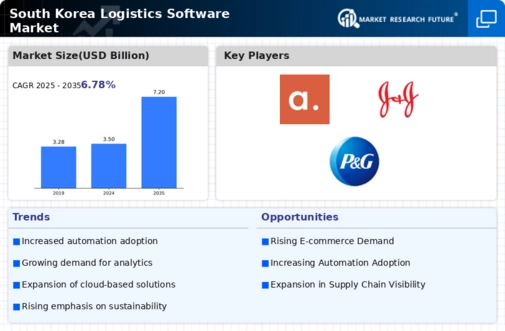South Korea Logistics Software Market Summary
The South Korea logistics software market is projected to grow significantly from 3.5 USD billion in 2024 to 7.2 USD billion by 2035.
Key Market Trends & Highlights
South Korea Logistics Software Market Key Trends and Highlights
- The market is expected to achieve a compound annual growth rate (CAGR) of 6.78 percent from 2025 to 2035.
- By 2035, the market valuation is anticipated to reach 7.2 USD billion, indicating robust growth potential.
- In 2024, the market is valued at 3.5 USD billion, reflecting the increasing demand for logistics solutions.
- Growing adoption of advanced technologies due to the need for enhanced supply chain efficiency is a major market driver.
Market Size & Forecast
| 2024 Market Size | 3.5 (USD Billion) |
| 2035 Market Size | 7.2 (USD Billion) |
| CAGR (2025 - 2035) | 6.78% |
Major Players
LG CNS, Hanwha Solutions, Hanjin Transportation, MOL Logistics, Samsung SDS, SAP, Nexen Logistics, Kuehne + Nagel, Hyundai Glovis, InComm, SK Holdings, 93 Logistics, Daewoo Logistics, CJ Logistics, Oracle













